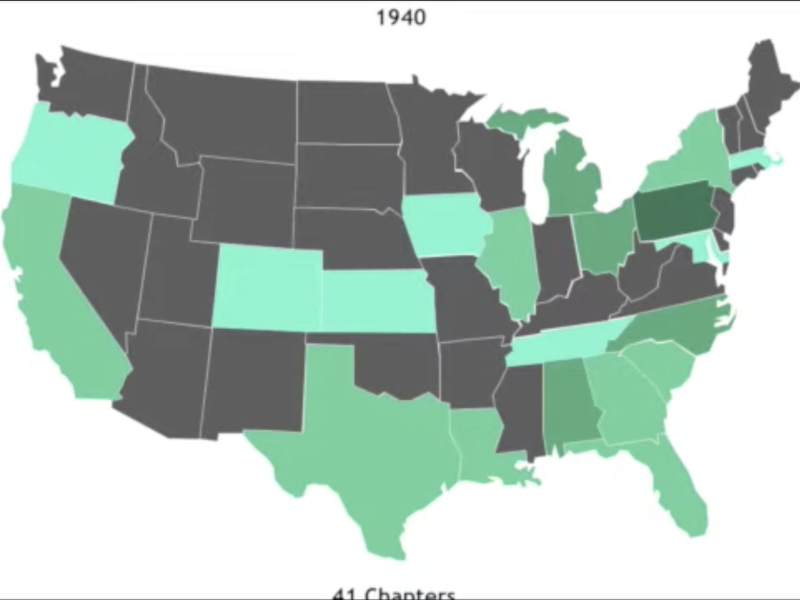





Written By Nik Koulogeorge

Written By
Published
Oct. 1, 2021
Updated
Nov. 21, 2021
Tagged
Fraternity expansion: the process by which a fraternity establishes or re-establishes a chapter.
Fraternity expansion professionals: the young men plucked out of college, paid sparingly, avoided by most other Greek Life professionals, and some of the few workers in the Fraternity/Sorority field of work required to provide objective results.
I recall being invited to interview for my Fraternity just before my senior year of college. I was excited to have the chance to start new chapters of my fraternity at schools across the United States, and the experience was no letdown. I ended up working in fraternity expansion for almost six years, and served as a recruiter, as a team manager, and eventually as the director of our growth initiatives in that time. This article focuses on that first gig: the recruiter role.
Some fraternities hire recruiters/consultants. Others, like my own, separate the roles. In either case, recruiters are generally at the bottom of the totem pole. They don't make much money, they work in a highly specialized role, and most do not stick around long enough to build lasting relationships with campus professionals (Who love to be worshipped befriended). But worse than these things, recruiters are salesmen, and everybody hates [a bad] salesman. J.C. Penney once said, "The best of merchandise will go back to the shelf unless handled by a conscientious, tactful salesman." Bids for lifelong membership in a fraternity are no different.
That said, recruiters are some of my favorite people to work with because, as I said before, their job requires results. The success of a new chapter, including its size, risk level, and the likelihood of winning fraternity awards, all depend on a high-intensity recruitment campaign. There is unlikely to be as high-pressure of a job in Greek Life beyond risk management. But the actual work of recruiters is not well understood and therefore easily dismissed.
There are different styles and approaches to expansion. A significant number of fraternities follow tactics popularized by Phired Up productions. Phired Up's founders admit that they did not create these tactics, but they were one of the first companies to offer consistent training and support to fraternity recruitment teams.
Here is a typical day in the life of a recruiter. (I have not been "in the game" for several years, so some things may be different because Gen Z is. . . Gen Z. But the gist is probably the same)
7:00 am to 8:30 am: Wake up, get dressed, eat breakfast, and make your way to campus. Depending on the location of the school and where you are staying, you may need to get up a little earlier. For example, students at Drexel University were more available for early meetings than mid-day meetings, so my colleague and I started meetings at 8:00 am and our commute required us to head out at around 6:30 am. For this article, I am assuming that most 1-on-1 meetings with potential members start no sooner than 9:00 am.
9:00 am: Arrive on campus and prepare for the ever-challenging task of finding a place to sit for the day. You need to be in a high-traffic area, which means giving up your seat/table at any point may result in you not having a place to meet potential members. It is normal to spend a few moments praising humankind's creator when you happen upon a free table without much hassle.
9:30 am to 12:00 pm: Back-to-back (and nearly identical) 15-30 minute, one-on-one meetings with potential founding fathers. You try to get to know them, their passions, and their interests. Then you float the idea of starting a brand new organization at their school. Those who have ambition and aren't timid will rush in Some need to be introduced to others, or for you to call their parents to assure them that, "Yes, this fraternity is actually different!" Others are not interested and not afraid to let you know that they are uninterested. It hurts, but you do not have time to care, because you have about 30 seconds to take notes before your next meeting begins (if scheduling goes well, more on that later).
12:00 pm to 12:30 pm: If you have not planned a meeting during this time, then you can eat food. It's good to keep a snack in your bag just in case. Meetings can be exhausting, and these are not "work meetings," they are pitches, one after the other, for hours on end with technical notes to take after each meeting.
12:30 pm to 4:00 pm: Meetings, meetings meetings. Maybe you set up a table if you are running low on leads. Tabling for an expansion professional consists of standing in front of the table and challenging passing students to rock/paper/scissors matches or something else that is simple and fun. But it's a trap! ("If you win, you get a high five and candy. If I win, you have to listen to my 30-second pitch!"). Eventually, if you are god-tier, you train founding fathers to table for you. (#EFFICIENT!)
4:00 pm to 5:30 pm: More meetings. Perhaps you schedule a meeting with the student affairs fraternity/sorority professional. This meeting can go one of several ways:
A casual meet and greet.
There is terrible news: The other fraternities are upset you are not failing OR someone you recruited was once arrested for tax fraud. Did you know? Of course not. . . or did you?
An exceptionally helpful tip or moment
Empty office. Perhaps there was a note. Hopefully, there's at least a text message. They probably forgot about you and are home drinking wine and watching something Student Affairsy like Rupaul's Drag Race.
Most tend to be the first or third. Fraternity/sorority advisors are typically on top of expansion stuff. If you are not terrible, it serves as a nice break from the terror of risk management.
5:30 pm to 6:30 pm: Dinner, maybe. Everything is becoming a blur. You at least need a Snickers.
6:30 pm to 8:30 pm: Some days you can go home and start rolling calls (next). Other days you will schedule a presentation for men who have expressed interest in your new chapter. Perhaps you present to a sorority chapter or student organization to gather more referrals. If you already have a group of founders committed to the cause, then you might organize a meeting with them. No matter what you choose, you will still have to talk. . . a lot.
9:00 pm to 10:30 pm: After you get back to your temporary home, you start preparing for the next day. Yes, it has been more than twelve hours, but you have notes to refine and you need to start calling people to schedule more one-on-one meetings. You might have hundreds of people to call. What does that mean? Another list of scenarios!!!!
You have to reveal on the call that you are a fraternity and not a generic "men's leadership club." They hang up on you. Sometimes they do not even wait to figure out who you are before they hang up on you.
You spend far too much time on the phone with someone trying to figure out the absolute best time to fit them into your calendar. College men do a poor job of knowing or keeping track of their schedules (in my experience).
"I'm really busy." Okay, Tim; you have 12 credit hours and a part-time job. This one hurts your heart because you are literally working 12-14 hour days.
"She referred me!?" Some men are just excited to know that someone thought to refer them. These are the best calls.
"Yeah, that sounds great!" These are also good calls.
No answer and no accessible voicemail. (Coded as "NVM" in your notes. That is like a combo of "no voice mail" and "never mind.")
There are probably more scenarios, but you get the gist. Sometimes a guy will have a friend or lover answer the call because. . . well, I don't know. That's strange. Who does that?
Once all of that is done, you go to sleep and do the same thing the next day. This is your life for five days a week. You are typically free from calling people on Friday night, but you have to work Sunday night to plan for the week ahead. Eventually, your Saturdays may be consumed with activities to help the founding members get organized and get to know one another.
Hopefully, when all is finished, you get a nice little vacation for all of your hard work. We would get a week of compensation time after every 6-week recruitment campaign.
This is not every fraternity's process, nor does it account for all of the random things that happen during your already busy days on a recruitment campaign. In my time at Delta Sigma Phi, we built expansions into grand opportunities to establish "movements." Our team had miniature rituals and traditions. We spent time talking with one another about our feelings to built trust and had regular coaching calls with other staff and external consultants. It was one of the most successful periods of growth in our organization's history.
To the fraternity expansion professionals: If no one else will thank you, then allow me to have the honor. What you do is important. It is a kind of work that few in the theoretical and academic field of work called "fraternity/sorority life" will ever understand. You are keeping our organizations alive, relevant, and modern.
Even if you are being thanked, it is probably not to the extent that you deserve. You should know - if you don't already - that you have changed or will change the lives of dozens of men for the better (maybe even hundreds or thousand if you stick around long enough!). Some of the men I recruited as founding fathers are people I stay in touch with or even look up to more than a decade after I started that work.
Finally, do not complain about the pay. You will get to see new places and you will develop essential life skills.
(Here's a random video I made many moons ago showing the number of chapters of my fraternity in various states since its inception in 1899. I am putting it here for fun and because it fits the topic of expansion.)
Fraternity Man is an ad-free and independent publication. Help keep it going and growing by contributing as little as $2. (Links below will take you to a secure payment portal via Stripe)
A free way to support: Subscribe to the Fraternity Man newsletter for [very occasional] updates and giveaways.